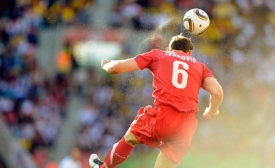public diplomacy
The U.S. government is struggling to coordinate the volumes of information from the many agencies and departments that make up slices of the public diplomacy and strategic communications pie. Congress needs to use its oversight to evaluate the variety of agencies, set specific goals, and ensure that the vital work of public diplomacy moves forward.
The trip was initially about much more than basketball — the exhibition games were merely a formality as the Hoya contingent toured the country, met with Vice President Joe Biden and sought to promote sports diplomacy between the world's superpower and its ascending counterpart.
The latest issue of PDiN Monitor takes a closer look at Sports Diplomacy.
Running a center for public diplomacy is good news per se, since it means further attention towards the global public opinion and the image Iran is creating of itself for the international community. Public diplomacy is the ‘soft’ tool...

Barry Sanders explores the public diplomacy potential of sports.
Sport is a gigantic and powerful medium for the international spread of information, reputations and relationships that are the essence of public diplomacy. The money spent world-wide on sport dwarfs what any government spends on public diplomacy. The size of the global audiences for sport and the audience’s level of interest exceed those of any other subject matter, including political news and the movies. The nature of sport—in its human striving for excellence and in its competition, its winners and losers—carries its own messages.
At a time when even the Chinese have realised the soft power of the media and been trying to understand it, speak its language and make it a national asset and not a national vulnerability, it is disquieting that your Government is reported to be thinking of setting up a small group to deal with issues concerning the accountability and regulation of media...
The anti-secrecy organization WikiLeaks in recent days has dramatically accelerated the pace at which it posts confidential State Department cables, exposing the names of people who spoke to American diplomats in confidence. The development has alarmed U.S. officials and human rights groups, who say it will endanger foreign nationals who helped the United States and make it less likely that others will do so in the future.







